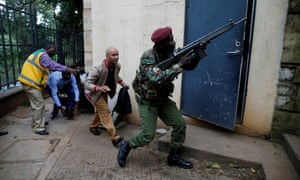Nairobi terror attack: gunfire heard hours after minister declares scene secure

Nairobi Kenya January 17 2019
Gunfire and explosions have been heard at a Nairobi hotel and office complex, more than 16 hours after Islamist extremist gunmen launched an attack that is thought to have killed at least 15 people, including a US citizen.
A security source in Nairobi said the operation to clear the complex was “slow and cautious” because of fears that attackers were wearing suicide belts.
The assault on the dusitD2 compound in the Kenyan capital, which includes a luxury hotel, restaurants, a spa and several office buildings housing international companies, was the most high-profile by terrorists in the country for many years.
The sounds of what appeared to be further exchanges of fire and a blast at the complex come after the the interior minister, Fred Matiang’i, said security forces had secured all of the buildings affected.
“The security teams have evacuated scores of Kenyans and [people of] other nationalities from the buildings,” he said in a brief televised statement on Wednesday evening. “We are now in the final stages of mopping up the area and securing evidence and documenting the consequences of this unfortunate event.”
The attack was claimed by al-Shabaab, the militant Islamist organisation based in neighbouring Somalia, on its in-house radio network and online. Al-Shabaab was responsible for an attack on Nairobi’s Westgate Mall in 2013 that left at least 67 people dead.
The alarm was raised at about 3pm on Tuesday when gunfire and explosions were heard at the hotel, in the upscale Westlands neighbourhood of the city. Dozens of ambulances, police vehicles and fire engines arrived at the scene as fleeing office workers filled the surrounding streets.
Witnesses said two cars had been driven towards the hotel complex at about 3pm. Security personnel came under fire before at least four gunmen entered the complex, detonating a large explosion and initially targeting a bank and diners at a Thai restaurant.
Survivors reported hearing a shattering blast and saw people mown down by gunmen as they sat at a cafe. Victims were left lying on tables, bleeding.
“We were changing our shifts, and that is when I heard a loud blast and people were screaming,” said Enoch Kibet, who works as a cleaner at the cafe and managed to crawl out a basement gate. “I couldn’t believe I was alive. The blast was so loud and shook the whole complex.”
Tuesday’s attack came exactly three years after a deadly al-Shabaab attack on a Kenyan military base in El-Adde in Somalia, in which about 140 Kenya soldiers were killed.
“Al-Shabaab mujahideen snipers are in operation in Nairobi, the capital of Kenya. Our reports confirm that mujahideen fighters stormed the target building,” the al-Shabaab statement said.
Images from security cameras show young men in black combat fatigues and loaded belts, armed with AK47s.
In the hours after the attack, the gunmen and security forces were engaged in a fierce firefight. Plumes of smoke rose into the air from several burning cars. “There was a bomb, there is a lot of gunfire,” said one man working at the complex, asking not to be named.
Others described office workers in the complex hiding under the desks or sheltering behind makeshift barricades. Hundreds were evacuated from nearby buildings.
Rashid Abdi, an expert in Islamic militancy in east Africa with the International Crisis Group in Nairobi, said al-Shabab was a versatile and patient organisation.
“It was always a matter of when not if. There has been some successes against al-Shabab in northern Kenya but if we have learned anything it is that al-Shabaab lulls security services into complacency. Months and years can go between attacks and then they strike.”
Though the Kenyan deployment in Somalia is one motive for al-Shabab’s attacks in Nairobi and elsewhere, the organisation is also committed to the broader causes of global jihadi ideology and sees the Kenyan capital as a key target.
Medics removed four bodies from buildings near the hotel , witnesses said. A medic said two more body bags were removed from another location nearby. One person died earlier at a hospital.
Kenya faced a spate of attacks after it sent its army into Somalia in October 2011 to fight al-Shabaab, which is affiliated to al-Qaida.
On 2 April 2015, al-Shabaab killed 148 people at a university in Garissa, eastern Kenya. Islamic State has a small presence in the Horn of Africa.
Nairobi is the economic hub of the east Africa region with a big presence of western companies, diplomats and tourists. Kenya has long been a significant security partner of the US and other western countries.
Authorities said they had been vigilant over the Christmas and New Year holiday season.
“Hotels and other public buildings remain under close watch. Reports from throughout the country indicate that everything remains calm and normal,” Kenya’s inspector general of police, Joseph Boinnet, told reporters.


